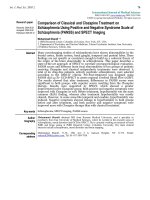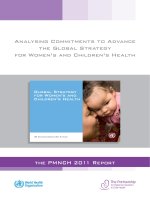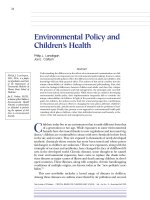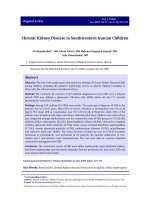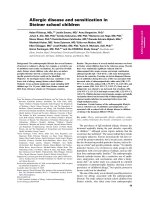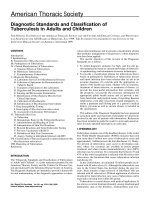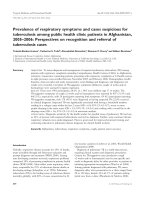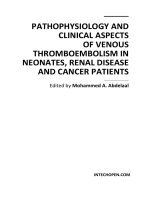Invasive candidiasis and cadidaemia in neonates and children update on current guidelines
Bạn đang xem bản rút gọn của tài liệu. Xem và tải ngay bản đầy đủ của tài liệu tại đây (806.14 KB, 17 trang )
INVASIVE CANDIDIASIS AND
CADIDAEMIA IN NEONATES
AND CHILDREN: UPDATE ON
CURRENT GUIDELINES
Dr. Le Nguyen Nhat Trung
Dr. Le Thi Thuy Anh
Content
1- Introduction
2- Diagnosis
3- Treatment in neonates
4- Prevention in neonates
5- Treatment in children
6- Conclusions.
INTRODUCTION
Invasive fungal infections (IFIs)
Candida ssp. : 8-10% of nosocomial
BSIs.
Non-albicans Candida spp.:>50%
High mortality rates: 7,7-26% -> 4354%
Table 1: spectrum acitivity of current
antifungals against Candida spp.
Organisim
AMB
FCZ
CAS
MICA
C. albicans
S
S
S
S
C. glabrata
S-I
S-Sdd-R
S
S
C. parapsilosis
S
S
S-I
S-I
C. krusei
S-I
R
S
S
C.guilliermondii
S
S
R
R
AMB: amphotericin B, FCZ: fluconazole, CAS: caspofungin,
MICA: micafungin.
Table 2: Comparison of methodology of guidelines for IC/candidaemia in
neonates/children.
DMYKG/PEG
ECIL
ESCMID
IDSA
Population
Children,neonates
Paddiatric
harmatological
patients, HSCT
recipients, other
malignancies
Children(haematologi
cal malignancies,
solid tumours,
allogeneic HSCT,
autologous HSCT,
recurrent leykarmias,
neonates
Paediatric nonneutropaenic patients,
neonates
Scope
Treatment of
IC/candidaemia in
children, treatment of
IC/candidaemia in
neonates
Diagnosis preocedures,
prevention/treatment of
IC/canidaemia
Prevention/treatment
of IC/candidaemia in
children,
prevention/treatment
of IC/candidaemia in
neonates
Treatment of
IC/candidaemia in
non-neutropaenic
children,
prevention/treatment
of IC/candidaemia in
neonates
Published
2011
2014
2012
2009
DMYKG/PEG: German Speaking Mycological Society/Paul-Ehrlich Society for Chemotherapy;
ECIL: European Conference on Infecion in Leukaemia; ESCMID: European Society of Clinical
Microbiology an Infectious Diseases; IDSA: Infectious Diseases Society of America
Diagnosis of IC/Candidaemia in
neonates and children
Standard diagnosis procedures: blood
cultures for yeasts,
cultures/microscopic examination of
approach liquid and solid diagnostic
specimens: Cornestone of diagnosis.
MIC: CLSI (North American), EUCAST (European standard)
1,3-beta-D-glucan(BG)
PCR
Treatment of IC/Candidaemia in
neonates
General principles:
prompt initiation of antifungal treatment
control of predisposing underlying
condition
removal of catheter.
IDSA: lumbar puncture and a dilated
retinal examination (B-III),remove the
catheter (A-II),imaging of the
genitourinary tract, liver and spleen is
advised in case sterile body fluid cultures
have persistently positive results (B-III).
Table 3: Comparison of the recommendations on therapy of
IC/candidaemia in neonates.
IDSA
DMYKG
ESCMID
D-AMB
A-II
C-III
B-II
L-AMB
B-III
A-II
B-II
A-II
C-II
Caspofungin
Micafungin
B-III
A-II
B-II
Fluconazole
B-II
A-II
B-II
D-AMB: amphotericin B deoxycholate
L-AMB: liposomal amphotericin B.
Amphotericin B : the preferred initial
therapy in neonates with candidemia (
grade 2C ). Alternate therapy or in
combination: Fluconazole.(Uptodate
2015).
Candidal CNS infections:
Amphotericin B (grade 2C
).Flucytosine may be added.
(Uptodate 2015).
Prevention of IC/candidaemia in
neonates
ESCMID and IDSA recommend the
use of antifungal prophylaxis in
extremly low birth weight neonates,
treatment of maternal vaginal
candidiasis.
IDSA: the prophylatic use of
fluconazole may be considered for
neonates < 1000g in nurseries with
high rates of IC/candidaemia (A-I)
“ We do not suggest the routine use of
prophylactic fluconazole in all
premature infants ( grade 2B).
Prophylactic fluconazole may be
considered in extremely low birth
weight infants in centers with a high
incidence of fungal infection”
(Uptodate 2015).
Treatment of IC/Candidaemia in
children
Table 4: Comparison of the recommendations on therapy of IC/candidaemia in
children
DMYKG
ESCMID
D-AMB
C-III
C-I
L-AMB
A-I
A-I
ABLC
A-II
B-II
Capsofungin
A-II
A-I
Micafungin
A-I
A-I
Fluconazole
A-II
B-I
Voriconazole
A-II
B-I
General management principles, the
removal of catheter is strongly
recommend (A-II).
The optimal duration of therapy for
uncomplicated candidaemia is 14
days after blood cultures are sterile.
Fluconazole seems no longer to be
considered at first choice therapy.
No recommendtation regarding
combined antifungal therapy is given.
Conclusions
For neonates, micafungin, fluconazole
and lipid formulations of amphotericin
B: strongly recommended
Lipid formulations of amphotericin B
and Voriconazole seems to offer
additional treatment options for first
line treatment in children.
Fluconazole: no longer to be
considered as first choice
Thank you for your attention!
